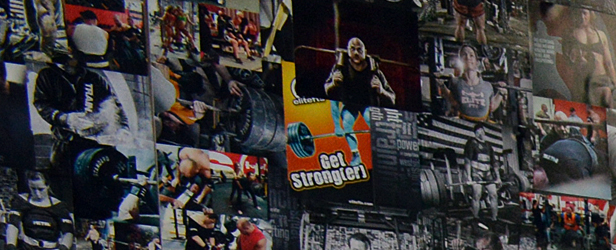
Did you know I keep a training log on the site? Not only do I post my own training but also business and training tips as well as random topics off my head. Here are 15
1. Coaches, Clients, and Bad Programs
What makes a good coach-client relationship? Like any relationship, the number one thing is respect, and it has to go both ways. The coach has to be patient and overlook your immediate flaws to see the bigger picture and be capable of figuring out what you need to excel long term. And, of course, the trainee has to accept that the coach is human and may not have all the right answers 100% of the time. This is something I see happening more and more, especially in bodybuilding.
Guys hire a coach to get ready for a show, and they work together for 12 or 16 weeks but things don't quite come together in time. So the trainee is disappointed, fires the coach, and hires someone else. The thing is, everyone is unique, and it may take even the most astute coach a few months just to figure out how your body works, what foods make you hold water, how you respond to training and energy system work, and how well you recover.
I made my best progress strength-wise when I spent 12 years under the tutelage of Louie Simmons. Twelve years is a long frickin' time, but I needed a year to buy into his system, and then at least another year for Louie to identify exactly what I needed to work on. Sometimes I wonder just how strong I could've become had I headed to Westside right after high school, when I was a 500-pound bencher but still relatively raw.
Physique-wise, I made great strides with John Berardi and Shelby Starnes and Justin Harris, but I never enjoyed the balance between health and body composition like I do now with John Meadows, and it's not because Meadows is any smarter than those other guys. He's just had over three years of watching my physique and tweaking my diet to figure out how my body works.
So find a competent coach who you enjoy working with, preferably a decent guy who won't abandon you when he gets busy. Then stick with him. Let him figure you out and approach this thing as a team.
However, I still need to rant: most coaches suck!
Look at some of the programs being pushed today. It's a travesty, and I honestly think it's gotten worse over the past five years.
It seems like many new coaches and trainers have zero interest in studying the science of training or in doing any research whatsoever. They don't teach the lifts properly – just watch some of their YouTube videos – nor do they know how to program them.
All they seem capable of doing is taking any successful program they can find and copying it (sometimes even selling it) without taking the time to even try to understand it.
I'll admit to being a bit of a technique whore, and I agree that you won't always see the best technique during a work set. And there's always the possibility of joint or structural limitations that make the lift look bad.
But that's not what I'm talking about. I'm not busting chops over coaches allowing partial reps, leaning forward in the squat, or slightly hitched deadlifts. I'm talking about things that would make anyone say, "What the fuck?!?"
I'm not going to elaborate any further. There are still many great strength coaches out there doing a fine job, but to those who I am talking to – clean up your act and start respecting your craft, or get the hell out.
You know who you are.
2. Fighting Demons
I've been through my share of shit, but 2010 was probably the worst year yet.
That year I lost my father. It was a terrible process that started with him suffering a stroke and being rushed to the hospital. While admitted, the doctors found he also had cancer.
My dad was eventually released and bounced back and forth between long-term care facilities and the hospital before eventually passing away a few months later.
Not long after my dad died, my wife suffered a pulmonary embolism and was also rushed to the hospital. Seconds away from dying, the doctors had to perform emergency open-heart surgery to save her.
Finally, on the business front, I had two monstrous legal issues that were coming to a head. So add legal wrangling and nonstop meetings on top of the normal day-to-day bullshit every business owner has to deal with, and I was at my limit for stress.
To combat this, I tried to do what I always did when life got stressful – I trained.
Normal types might scoff at the notion of hitting the gym with so much shit going on, but they aren't seeing the big picture – or at least my big picture. I don't punish myself with drop-sets and high-rep squats to build muscle. I do it to kill my demons.
We all have demons inside of us. Some have more than others, and some guys can deal with them better than the next. That 40-something stressed-out businessman who suddenly snaps and bludgeons the Wal-Mart greeter with a plunger is an example of someone who can't handle his demons.
I'm not saying I'm always inches away from committing manslaughter, but I can be a real dick when I let stress get the better of me.
So I smash my demons. I crush them under the bar.
And if I'm too fucked up to train heavy, I torch them with extended sets, rip them apart with rest pauses and drop sets, and then chase them away with whatever fucked-up finishing exercise I can think of.
The demons always come back, mind you, but as long as I have a key to my gym I can stay one step ahead.
3. Something Interesting To Me
My background is in strength and conditioning. There is no point in rehashing it in this post, but it spans three decades. Over this time I have heard, read and have been told by other lifters and coaches that those who don’t have under the bar experience or advanced education should not be writing or teaching others how to train.
I have stated my checklist many times: what have they done themselves, who coached them, who they trained with, what is their formal (or informal) education, and who have they trained. I stand by these, as I feel these are important attributes to tell who is good and who isn’t. These benchmarks will not be met by every coach and the degree at which each will be met will be different. For example, you can have someone with great under the bar experience with zero formal education. This person could be a great trainer, but I would say they could be better with more education… and so on.
I have read MANY other checklists such as mine and I agree with them as well, but here is where I get confused and things become distorted. When a trainer or coach creates a product or service and wants to bring it to market, they feel, based on their name and reputation, that it should sell and they should become millionaires because they know their shit.
BUT, the day they sell a product and service is the same day they are no longer “technicians” – they have entered into another carrier or field call business.
So, let’s flip my checklist around some:
1. In business, what have they done?
2. In business, who did they learn from?
3. In business, who did they work with and/or for?
4. In business, what is their formal (or informal) education?
5. In business, what is their sales track record?
Yet, there they are using some of the worst marketing in the world (to those of us in business, we see this the same as they do a really, really bad squat set), have no idea how to create a marketing plan, and feel taking the time to do so is below them (yet they would never think of training someone without a plan).
They will study for years on how to train someone, but won't take the time to read a few basic business textbooks.
Interesting, isn’t it?
4. You're Stronger Than You Think You Are
Look, any dog will bite if you fucking kick it hard enough. You've got to be willing to fix your attitude and get your shit tuned in. You've got to be around people with the same attitude that you want to cultivate. If you start hanging out with successful people, you're more inclined to be successful.
If you see guys busting their ass, straining and pushing against weights you didn't think they could move, it's going to teach you a lesson. You're going to find out that you're a lot stronger than you think you are once you stop being a pussy. I think you can learn attitude. Everyone's got it in them.
And everybody's emotional strength falls on different levels. Just because one guy is psyched up and has a look of intensity doesn't necessarily mean that the other guy next to him who looks like he's falling asleep isn't internally just as driven as the first guy. That's where people get a lot of this confused.
Attitude is contagious, right? But it's also the fucking plague. So if you get a guy in there who's working against the group, who won't shut up or is asking stupid questions, you need to get rid of the dipshit and move on.
5. How to create a great strength training tips post, just like a GURU.
How to create a great strength training tips post.
Step 1. Tag #Beastmode or some other #hardcore #insane or #intense stamp to it.
Step 2. Don't look like you train. You can always get around being small by wearing five hoodies and weak by never posting pics or videos of you training. You can also just be small and make one of your tips that it is worthless to be anything but #strong and that "nonfunctional" muscles are worthless.
Step 3. ALWAYS make sure to note you are a "real" coach and not an Internet guru.
Step 4. Make fun of isolation movements.
Step 5. Push big compound movements.
Step 6. Make a word up or use something that nobody has ever heard before. Instead of saying to make sure you are tight when you squat, say you need to be antipliable.
Step 7. Write about all the people you have learned from (that you have never actually met) and the value of the 10,000 seminars you went to... but say that you learned the most in the hallways and dinner tables.
Step 8. Toss in something that is totally random and out of the blue. Such as "Behind-the-back wrist curls are awesome for grip and shoulder flexibility. If you do anything out of this list, do this one and you will notice a huge difference in your training." Just make sure what you note hasn't been noted by anyone else over the past year or so.
That's enough for now. If you put some time into each one of these and really expand on them, you should be able to slap together the Top Five Tips For Total Strength Domination.
6. Everything is easy
We are now in the age where everything is easy, and you should never train to failure or suffer adversity.
You can find shortcuts to everything if you do a quick Google search. Someone (actually many people) will be there to tell you how to get rich quick, the best way to get strong, and hell... there are even many telling you how you are not living life on your own terms.
This topic is another article in itself, but this did cause me to make a couple posts on Facebook today...
---
"Get ready for great tips you won't read in any textbook!" - Every time I read and hear this I brace myself for some mind-blowing shit.
Then what usually follows is something I learned in kindergarten.
*This post was prompted by two to three videos and one article I saw stating "You won't learn this in any textbook!" that then went on and made main points that were essentially saying: you should save your money, you will have to work really hard, take your time and double check your work, be willing to take a risk, reinvest back into yourself, and so on.
Are you kidding me?
While I agree with all of this, the reason you don't find it in a freaking college textbook (and I am sure they are there if these people actually took a general business class) is because you learn this in grade school.
If you are going to speak about business tips that can't be taught in school, tell me something useful like how to reinvest capital in SURE ways that will have a positive return, how to predict (with certainty) real market trends, and what promotions will have the biggest bang for the buck.
... not that I have to work really freaking hard and I might lose some sleep from time to time.
7. Three reasons why your training sucks
1. You Procrastinate
There are several ways you are doing this.
You are procrastinating by planning how your program should be laid out for the next quarter.
You’re procrastinating how your next training cycle or block should be programmed.
If you are doing these, then you are procrastinating how your accessories should be programmed. You might even be blowing off your accessories.
You are procrastinating the process of determining your weaknesses and how to address them.
You are procrastinating doing the things you need to do to be recovered and ready for the next training session.
The odds are VERY high that you are procrastinating SOMETHING and whatever that something is...
...is exactly the thing you need to be doing.
2. You Forget You Are Human
Too many of us get to a point in our training where we begin to take things for granted. I still remember last fall very well. EVERYTHING was going well. I was lean, my strength was better than it had been in years, I felt great and like I could take on the world. I made this statement to my training partner one day after breaking a gym record.
"I'm in too good of shape and too strong right now."
Four weeks later I couldn't walk without pain, my body weight begin to climb, and I was losing strength week by week.
Four months later I had a total hip replacement.
Talk about taking my training for granted!
You don't really know what you have until it is stripped away and you have to start all over again.
I think every person who has ever wrote a book on how to get stronger or add mass begins their story with how weak and small they were when they started. They couldn't do a push up, squat the bar, deadlift 135 and so on.
This is the same place most of us start. It's called the beginning, and you progress from there.
The part that REALLY sucks is when you have to revisit that "beginning" because of illness of injury. I can't count the number of times I have had to start over and couldn't bench the bar, or stand up from a chair without help. I also dropped 20 pounds of lean body mass.
But you earn it back day by day, rep by rep, session by session.
The take-away message is to realize that we all do get older, wear and tear does add up, and there will be a time when we need to start over or accept the fact that we may have to change how we train. Fighting this with ego is the worst thing you can do. Fighting it with intelligence is the only chance you have for longevity.
This is what will keep you in the game longer and allow you to perform at your optimum level.
3. You Listen To Bad Advice
Have you ever been told, "You can't do that", "That doesn't work", "You're too old", "You haven't been around long enough", "You're too beat up", "You’re not old enough", "You're not ready yet", "You need to do this", or "You need to do that"?
This and all the other shit is just what it is: "shit". Unless what you are being told is provided with clear, concise, and specific (to you) reasons why, then it is what it is: "bullshit".
Everyone wants to tell you want you "need" to do, but very few will tell you why or show you how.
There are many more reasons I can (and may) write about later - but three is enough to absorb for one day. The most important thing is to ask if you are falling victim to any of these.
8. Three Things You Need to Know About Training
1. Showing Up and Being Consistent Isn't Enough
We have read "be consistent" thousands of times, but this is a bit of a misconception. I know of many lifters who lacked consistency and still made it to the top of their sport. I also know of thousands of lifters who are extremely consistent and fail to make progress. This begs the question if it is better to give "half-ass" efforts all of the time or "all you have" when you are there?
Yes, genetics and other factors play a role, but if all someone thinks is you have to be consistent and do so for a long time, they are mistaken. It IS a factor, but unless you have a solid plan and put in EFFORT, the gains will not come.
2. It Gets Easy Once You Reach X
It doesn't get easier the bigger or stronger you become. It actually gets harder. It gets a hell of a lot harder.
Once you get there you need to:
1. Keep the gains.
2. Build on the gains.
3. Minimize the damage.
4. Keep from getting injured.
5. Find the best environment.
As you climb the ladder of training success, all the major things become a given. You will show up, you will do the work, you will have a plan, but the minor things begin to factor in big time.
As your training age increases, so does your ability to recover, the wear and tear, your technique, etc. All of these things depend on smaller things like nutrition, water, rest, recovery, stress, volume, workload, intensity, and many more.
One great example I can give is if you are a lifter with 15 years under your belt, you can't de-load by taking one or two weeks off. If you are a beginner and do this, you will feel great and be able to pick right back up. If you are advanced, you will feel like shit and more beat up every day you take off. After two weeks you will feel like a cripple. The way you de-load becomes critical for an advanced lifter, while a beginner can get away with just about anything.
There are several ways to do this correctly, but the one I have had the most success with is keeping the volume the same but dropping the intensity.
3. There Is No Perfect Program
Everybody wants the magic sauce. Well, it doesn't exist. Granted, many people will tell you it does, but it doesn't. The simple fact is that nobody has it figured out.
Let me put it this way. Most training science is based on the super-compensation model. There are thousands of studies that support this, BUT this works differently based on our aerobic base, your anaerobic base, your training history, your hormones, your mental state, even your vital signs. So here we have what is supposed to known as an absolute, but it's influenced several, if not hundreds, of things. This is the goal of the entire training process - how to use and influence this model. I know this is an extreme example, but do we know anything with 100% certainty? How many "proven" absolutes have been in our history that, over time, we have proven incorrect? A L-O-T!
My point is that it all comes down to our best "educated and experienced" guess.
I will be the first to point out that there are people whose best guess sucks because it is only based on a couple variables and experiences, while there are others who have spent their lives under the bar, coaching, studying how the body works, reading the research, talking and studying other great coaches, and have a far better grasp of the process than someone else.
All of the top coaches I know and respect agree that the best program is the one that works for YOU. This means that it fits your needs, goals, situation, strengths and weaknesses.
At the beginner and intermediate level, this can be achieved with a vast array of programming. The higher you rise, the more specific it needs to become.
At the end of the day, it is your responsibility to determine if what you are doing is optimal and effective. If you don't know this, then find someone who can help you.
Everyone has their own bullshit diet, so I figured I would jump in and create my own diet that is based 100% on bullshit logic (kinda like the rest of them, with the difference being I am admitting it). In classic elitefts™ tradition, I will even give you this for FREE.
The "Contrast Diet" is based on how the body reacts to cold and hot. We all know that when it's cold, your body slows down. If it gets cold enough, you will slow down so much you will die.
When it's hot, your body speeds up.
Bullshit logic would then assume if you can slow your fat cells down using cold foods you would then be able to SHOCK and kill these cells with hot foods.
Hence the contrast diet.
Here is how it works.
First you need to maintain (somewhat) constant blood sugar, so you drink a Coke 60 minutes before and 30 minutes after each meal.
Begin the meal with one ice cream sandwich - this will slow down the fat cells, getting them ready to shock.
Then wait 5-10 minutes and eat one bowl of hot chili. Add extra sauce if needed. You really need to be sweating. This HOT food will burn and kill the fat cells.
Now hit another ice cream bar to slow things back down again.
Repeat.
Three sessions should do it.
See, I don't just make this stuff up. I DO IT!
Yes, I will admit this is stupid, but it's not that far off SO much of the other stupid things I see every week. If I put more thought into this, and did some yellow highlighter marketing, I could have a best seller here.
9. It's SO Simple!
For years I have sat back and read the same shit over and over again. Things such as...
•Training has become too complicated.
•We need to get back to the basics.
•Information overload.
•Most of what you read about training isn't needed.
•All you need to do is the basic lift and leave.
•If you want to bigger squat, bench or dead than all you have to do is squat, bench and deadlift.
•Technique is overrated. If you want to squat, then just sit down and stand back up.
•Percent Training is worthless. Just go heavy or go home.
•Just go to the gym and work hard.
•If it’s not done with a barbell, then don’t do it.
---
I can greatly expand on this list, but I think you get the point...
Training needs to be simple if it is going to work and be effective, otherwise it’s worthless. It's SO simple!
Isn’t simple determined by who is receiving the message?
- Is simple for me the same as simple for you?
- Is simple for someone who have been training and acquired a Masters Degree in exercise science the same as simple for someone who’s been training for only a couple years?
- Is simple the same for someone who has competed and been in the sport 30 years the same as someone who has been competing for 2?
- What about those who have never set foot in a weight room and just want to get strong? What is simple for them? What are the basics for them?
For example, here (listed below) is a basic squat session that many powerlifters would use. Many would consider this simple and getting back to the basics …
…but is it?
If I showed this to a true beginner (I spent over a decade training them, so I know how they think) the inline notes would be the questions they would have.
Foam Roll
Hurdle Drill x4
Leg Swings x10
Sleeper Stretch
Couch Stretch
* They would have no idea what any of this stuff was, not to mention if someone had disc or joint issues related to degeneration, spurs, etc. this warm up would not help but would rather exacerbate the problem. Maybe it’s a bit more complicated then just moving the joints around to warm up. Maybe the individual’s joint function and/or dysfunction has to be taken into consideration.
Box Squat
*Let’s leave the box out of this for the moment and just go with the squat. I have read countless times that this movement is made way too complicated. All you really need to do is sit down and stand up (I actually heard this once at one of our seminars and then found something else for that person to do, as they had no business teaching anything). If this was the case, then this is a perfectly acceptable squat.
*Just sit down and stand back up. It’s really that easy. No need to make it complicated by teaching people how to track their joints safely. That would be making things way too complicated. Just squat! Screw safe movement patterns! Squat, and when it doesn't progress, squat more. When this stalls it's because you don't train hard enough, so squat even more.
40%x5
* 40% of what?
Their 1 rep max?
Their competitive max?
What they want to squat?
What they think they can squat?
Is it 40% of last week?
Should they max out first and use 40% of that?
If it is 40% x 5 doesn’t that make it 200%, how do you determine 200% and of what?
If it is of the one rep max, what if I don’t know? Wouldn’t this one rep max change based on where someone is in their training cycle? Or if they are sick or coming off an injury?
*This is why percentages are too complicated and stupid. All they have to do is just pick up heavy shit and get back to the basics.
Back in the day, all they did was lift heavy shit and look how strong they got.
Percentages are a complete waste of time!!! (Yet every weight you lift is always a percentage of something.)
As for the reps, how are they done? Fast, slow, with a pause at midpoint, pause at start? What about the rest between sets?
Wait!
All this doesn’t matter, just get back to the basics – but before you do this try and do 70% for 3 reps at ½ the speed you would normally do, and then tell me this doesn’t matter.
55%x4
70%x3
85%x3-5
85%x2-4
85%x1-3
-10%x5-8
Eccentric Glute-Ham Raise
3x10-15
*Accessories are stupid and a waste of time. They won’t make you strong, so don’t do them – just stick to the main lift (sit down and stand up). There is no such thing as weak points - just do the freaking lift and it will get better! Oh, wait, you’re looking for answers because your lift is stuck, right?
That's because you are making it too complicated. Train harder and keep pounding the same lift more and more. Don't worry, overuse patterns are bullshit anyhow!
If you do decide to use the GHR, you were told to just do them. Body doesn’t matter, nor does the range of motion or speed of moment. Just hop on and swing from the bottom to midline for 10 reps and be done.
Doesn’t matter – anything more is just to complicate things.
*I can’t do this any more because it's getting too complicated.
I am hoping you see that training variables DO matter and what MANY people think is simple IS complicated to others. The reason we see so much stupid shit is because it is SO much easier to just say “keep it simple, don’t make it so complicated” than it is to actually take the time to help and teach someone how to do something. Oddly enough, in many cases, this is the exact same way those giving this advice were taught.
TAKE AWAY:
The “keep it simple – it’s not complicated” answer is nothing more than a blow off answer because people do not want to take the time to help – that is, unless you pay them, then all of a sudden it’s no longer simple and they know ALL of the answers. It actually becomes so complicated that you find out you are doing basic natural things incorrectly.
10. Trying to be like everyone else
11. My Training
Back Ground: I have been training (seriously) since 1983 when I lifted in my first powerlifting competition. I officially walked away from the sport in 2005 due to a number of reasons. With no regrets, I have paid, and continue to pay, a price for the years I have spent in the Iron Game. I could list a very impressive list of injuries, but will only note the ones of relevance today. In 2005, I was told I needed my right shoulder replaced and have lost significant range of motion. While relatively pain free, I do not have the ability to hold a squat bar on my back, bench press to my chest or press overhead. Late February of 2013, I had a total replacement of my left hip and was told my right hip was not far behind. I also have various nerve damage that has just become part of how I live.
In short, I am a washed up meathead that just can't let go. What you see in my training is not a lifter fading away but one fighting his ass off to go out in a blaze of glory.
I do not train to get better, I do not train for health, I do not train to get stronger and I do not train to look better.
I train because that is who I was, am and always will be. My training extends far deeper than physical reasons and if I had to explain, you would not understand.
This is not saying my training is without logic or objectives; my main objective right now is to drop body fat while still being able to train my ass off (without tearing off. something else.)
Training Credit: John Meadows helps design my training. I customize based on a few factors being injury history, strength levels, a kick ass gym and training history.
Diet Credit: I will give John credit once I am actually doing everything he wants me to do.
12. Training Adjustments
Hi Dave - I just watched the t-bar row drop set video w/ John Meadows and Ben Pakulski. Looking at the total amount of work you guys did over the whole session made me wonder how to determine whether you've done too much work or not enough. I often find myself holding back on the basis of "stimulate, don't annihilate", hoping not to ruin the next session's work by over-taxing my recovery.
How do you know when to push sessions like this so far into the red zone?
How do you know when you've gone too far?
Additionally, how do you fit it into a greater long-term scheme of training rather than "the workout of the day"? [My goals are primarily in bodybuilding.]
- Nick
The first two weeks and last two weeks of every phase, the volume is cut back.
I also structure my 12-week phases a bit differently than most of John's clients. I can do this because I have no goal to ever step on stage or lift in a meet again. My goal in training is simply to be able to train my ass off for as long as I can.
Here is how we have modified it...
Phase 1
I spend the first 12-week phase accumulating as much strength as I can. This means my focus on technique is not as tight. I worry more about the movement than the muscle and trying to increase the weight and/or reps each week. Very little is done in terms of intensification (strip sets, force reps, iso tension, yielding, tempo and so on). This is usually when I am gaining weight and eating about 50-60% of what I want. This will be the strongest I will be all year, and also the biggest and fattest.
The second phase I transfer to 50/50, so half of my movements focus more on training and contracting the muscles. Some intensification is added. The goal here is to shift from the force of movement into control of movement and contraction. I have found I can't shift gears from one phase to another, and I need some stagnation and transition time. My diet also becomes 30% of whatever I want and my weight (or bloated weight) starts to come off.
The third phase is 80/20 with almost all of the focus on the muscle. Diet becomes strict, and body fat begins to fall off at a pace of .5% every two weeks. This is when I will be my leanest, recovery is awesome and I feel the best.
The fourth phase is converting back out of phase three with the goal of stabilization in mind. I have yet to master this phase. We "almost" made it 12 weeks last time.
I should note that these are my modifications to John Meadows’ program. I do compensate John for his customized training and I do follow what is written, but change the way I will do the reps, rest periods, sessions per week and other factors to fit the progression listed above. I do this because I love to go balls out year round, but need to do so in ways that allow me to do it without destroying myself. I have many preexisting issues and damage and this needs to be accounted for in my training and nutrition.
Looking back, John and I have spent HOURS discussing these modifications and that fact that he is older is a huge asset because he understands where I am coming from and why. He also understands different training schemes, so we are able to bounce ideas off each other and I do not feel like I am speaking to someone with no clue what I am talking about. His background is 100% in bodybuilding and mine is all based in maximal strength development. These really are two different worlds.
I am fortunate to train with John one to two times per week so there is constant feedback. At the same time, I try to keep my training closely in line with his so I can better help him get ready for his shows.
One other extremely important note is that John LISTENS to what I tell him and provides his feedback and insight on if he think it will work, if it’s experimental or too much of a risk. Just to have someone who listens and provides a different perspective is a huge asset. I have had four or five different coaches over the years, and very few of them ever listened to what I thought, let alone worked with me on how to apply it. I have been training for 30 years so I have a pretty good idea of what will not work. Actually, I have a really good idea of what doesn't work for me.
13. Training Videos
14. Taken from my Training Log 9/26/2013
I'm now POST total hip replacement surgery (February 26, 2013). Previous training log posts have covered why this was needed, the rehab and the plan moving forward. This was and will be MY personal rehab & training plan put together with the help of my Orthopedic Surgeon, Medical Doctor, Physical Therapist, Trainer, Training Partners and my own personal experience and education. This in NO way constitutes medical or physical Therapy advice.
If you have any injury/rehab type issues I STRONGLY suggest you take the time to put together a team of professionals to help you diagnosis and treat your issue(s).
This simply was my story/journey. Now we are entering the next phase; getting strength back, losing excess body fat and getting back to what I love most about training - TRAINING HARD!
Disclosure: My training is being specifically designed for me based on my individual needs by team Elitefts Adviser John Meadows. I do compensate John for the programing he provides and have been working with him with my diet and training for close to two years.
The story continues
Enjoy... my life... you amusement
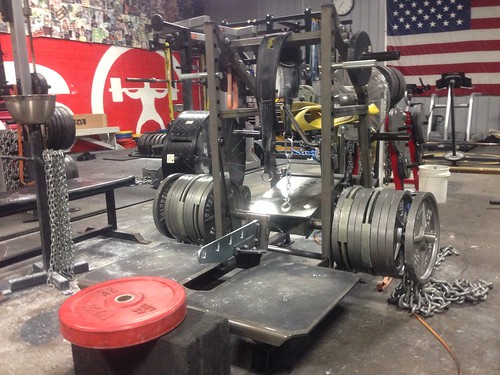

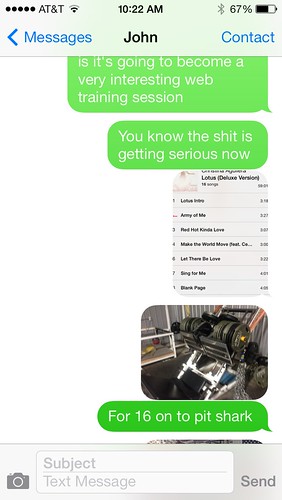
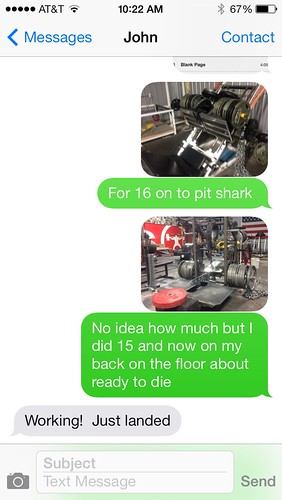

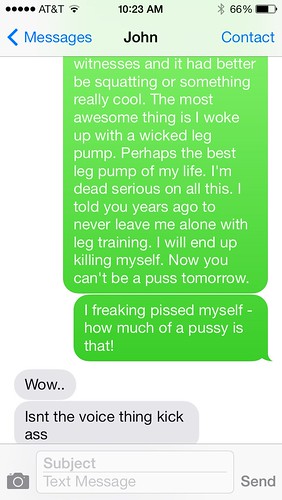

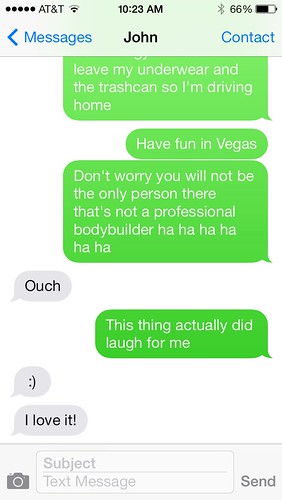
15. Why Elitefts does not charge for content?
This was from a private four-hour consult I had with Clint Darden when he was in the States. This wasn't recorded to become public, but Clint does feel there are things that were discussed that could help others, so I agreed to him posting these recordings. In this clip you will hear why we do not charge for the content on elitefts.com.
Just to be clear on this, I do know that this is not a great business move. Content is our more valuable resource, what we have become best at, and has been used in one form or another to create many of the top lifters, coaches and businesses in the field today. This isn't being cocky or bragging, but fact. You can see this in the backgrounds of these leaders in where they come from, learned from or were inspired by.
Education is our #1 asset, and the money we put into the content we provide ranks as one of our largest expenses. I also know content carries a VERY high profit margin and is extremely scalable with little strain on a company. Having 100 members or 10,000 members is just a matter of increasing server space and bandwidth. Increasing from 100 orders to 10,000 orders is far more complex, involving: moving, hiring more staff, inventory control, HR, Legal, and the list goes on and on.
There is no doubt based on what I see and know about this marketplace that we could be 15-20x more profitable with a fraction of the staff if we put all the focus on making money on content: added a pay section, video downloads, more eBooks, seminars, certifications, charging for multiple sources of advertising and other revenue streams I am forgetting. Before I get the flow of replays, yes I do know this content helps sell products, but the conversion rate from these pages to the store is extremely low. We could kill ALL the content pages and the store traffic would only drop less than 5%. We have tested this several times. This is how low the conversion rate is, and this is only based on traffic - not sales.
If you are one that says you buy from us because of the content we provide you are in the very small minority. We have studied and tracked this because we have considered making them two different sites; the content may actually be hurting sales by pulling people away from the cart (3/4 of the home page is links to sections of the site that do not generate revenue).
Yet, every time I think about this (and it is more than people realize because there would be a significant increase in profit margin and a huge drop in expenses, headaches and stress), I think of who I am and who I have become in and outside of the gym. While I am far from perfect and am a serious work in progress, I think of those people who stepped up and showed me how to train and how this could be used in other aspects of my life.
This CAN'T all be about money.
Not that I am against making it, but I feel more strongly about the social responsibility and legacy we will leave. I don't want to be known as the company that burned a hole in your wallet, but the one that helped you break a PR, the one that showed you it is okay to be WHO you are, the one that raised your standard for what being a "meathead" represents and should be. The one that showed you that life DOES have adversity to overcome and that is perfectly normal and needed to grow.
... and yes I do know this means some people will take advantage, they will NOT see value in the content because there is no price tag, and we will be seen as...
"Oh, you mean those guys (lifters) who write articles, what do they know about equipment?... equipment is all we do, why buy from a bunch of meatheads who spend all their time under the bar?". - What we have been told many times from customers who are getting quote from our competitors.
I know this, and I "get" it. I also know it hurts the growth of the company in a big way. I know this now more than ever. While frustrating as hell, I can live with this because I know we care about making a difference first. We did this before we ever sold a product, so inside we all know some things are more important than money.
Lastly, I have been told several times that the days of "passing on and giving back are over" and I am no longer that teenage kid that was influenced and has already given back enough, that I need to look at this from a broader perspective, build a nest egg, etc. Maybe they are right, maybe the world has changed, maybe the industry has moved so far away from this that it no longer matters. Just because the world or industry changes doesn't mean it has to change me. There are ways to adapt and grow without having to change your beliefs and who you are. If years from now this causes the downfall of elitefts, I would rather go down doing something I feel is right and good for the industry than the guy who did whatever was needed to make a buck.
In the end, will any of this really matter?
Maybe, maybe not, but it has to me for over 30 years and still does today.
We just launched the Programs that Work manual. Many of you helped contribute to this, have already supported it and have helped spread the word. Thank You!
For those that do not know this is our Holiday Manual (this year it was so big we needed to make two) that we do as a team to raise Money for Make-A-Wish OH, IN and KY. Every cent of this goes to the foundation. Elitefts eats the sales tax, download fees, processing fees and labor hours put into creating these. We still need your help promoting these. Please share and promote in any way you can think of. As noted, NOTHING goes to the company. These manuals represent more than just a ton of awesome programs. They represent us all coming together to show the world that care about more than just PR's, what we lift and how we look. They simply represent we care.
















